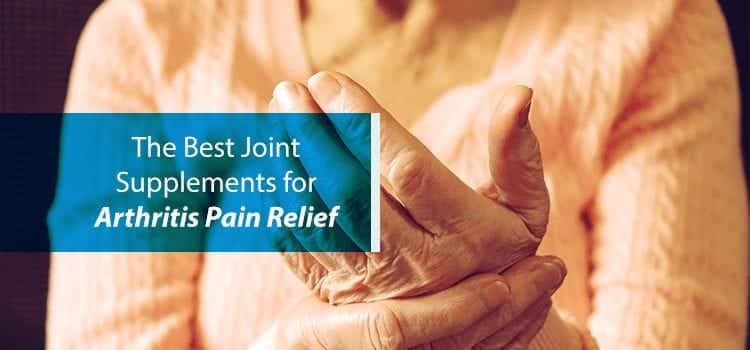Are you suffering from arthritis pain? If so, you may be wondering about natural remedies that can help to lessen the pain. After all, some pain medications harbor nasty side effects and others have even been deemed to be habit-forming. Finding the right supplements for you may reduce the use of these costly—and potentially dangerous—medications.
In addition, certain supplements have demonstrated effectiveness in soothing arthritis pain. Use this guide from NJ Spine & Ortho to understand the different types of arthritis pain as well as the various classes of supplements that may help.
What is Arthritis?
If you were recently diagnosed with any form of arthritis, then you probably want to know more about your condition. As one of the leading causes of disability in America, arthritis can impact just about anyone. According to the Arthritis Foundation, arthritis affects more than 50 million adults and 300,000 children. To put it into perspective, that’s almost the population of the states of New York and California combined.
Arthritis is an umbrella term for a set of chronic conditions that cause inflammation of the joints. Believe it or not, there are actually more than 100 types of arthritis and inflammatory diseases. These conditions cause mild-to-severe swelling, stiffness, and pain in the joints. They also can decrease your range of motion and make everyday tasks, like climbing the stairs, very difficult.
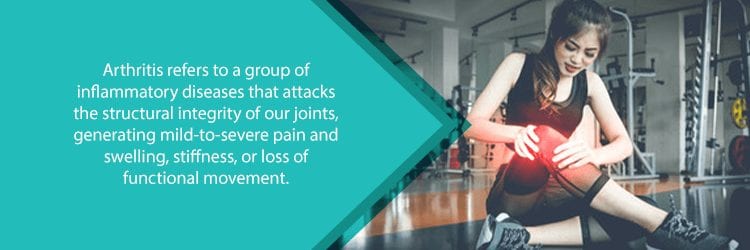
How to Prevent Arthritis
Unfortunately, doctors have yet to identify a single cause of arthritis. The condition may develop at any time and without any forewarning. There are, however, some risk factors that you should know. Some of these factors—like age, gender, and family history—are completely outside of your control. However, if you are interested in arthritis prevention, there are some lifestyle changes that you can make. These modifications include:
- Occupational & Leisure Activities: Strenuous jobs and high-impact activities, especially those that require excessive squatting or bending, can trigger arthritic episodes, such as bouts of hip joint pain. (To learn more about how you can enjoy some of your favorite activities free of pain, check out our blog – Hobbies that Cause Neck, Back, & Joint Pain.)
- Smoking: Tobacco users have an increased risk of developing conditions like rheumatoid arthritis.
- General Health: Overweight or obese individuals are more likely to develop arthritis. In addition, extra weight causes stress on the joints, which can worsen your condition.
- Injury & Infection: When joints are damaged by trauma or spinal infection, arthritis is more likely to develop.
- Diet: While certain foods do not cause arthritis, they can worsen inflammation that is already present in the joints. These inflammation-triggering foods include sugary snacks, processed foods, refined carbohydrates, and saturated fats.
Common Forms of Arthritis
As noted, there are many different types of arthritis. While some are very rare, others affect millions of people. Two of the most common forms of arthritis include:
- Osteoarthritis (OA): A disease that affects the bones and cartilage that line our joints. Once cartilage starts breaking down, our bones start to grind against one other instead of gliding. This causes inflammation and abnormality in the joints, leading to even more pain and stiffness.
- Rheumatoid arthritis (RA): This type of arthritis affects the body’s immune system. When the immune system starts attacking the joints—mistaking our cartilage for substances like bacteria or viruses—it generates inflammation. This results in pain, swelling around the joints, and damage to our bones and cartilage.

Using Supplements for Arthritis Pain Relief
Arthritis is truly an inflammatory disease. But, luckily, certain dietary supplements have proven effective at reducing the levels of inflammation in our body. In addition, these supplements may encourage the body to repair and reform damaged cartilage. Here are some dietary additions that you might wish to consider for arthritis prevention:
Anti-inflammatory Properties of Fish Oil
Fish oil offers benefits for heart health, including lowering your blood pressure and cholesterol. The omega-3 fatty acids in fish oil also help the body to create powerful anti-inflammatory chemicals known as resolvins. Furthermore, many patients who suffer from RA have found fish oil to be especially helpful.
Don’t like taking pills? You can get a healthy dose of fish oil in by eating fish like salmon two to three times a week. For those who don’t like the taste of seafood, you can also purchase capsules, soft gels, or liquids instead of introducing fish into your kitchen.
When choosing a source of fish oil, make sure that toxic chemicals like mercury or PCBs have been filtered out. For instance, avoid eating swordfish, tilefish, or king mackerel species that often have higher levels of mercury.
Capsaicin for Back Pain Relief
Do you like hot peppers? The heat-producing agent in chili peppers may provide relief for lower back pain. You don’t have to fill your grocery cart with the hottest peppers available. Purified capsaicin is available as a topical cream, patch, or gel.
Capsaicin works by activating the nerve receptors that are responsible for triggering itching, stinging, and heat sensations. With prolonged use of capsaicin, these receptors become overworked and lose their ability to function properly. And, this can aid in reducing the pain associated with arthritis.
To be effective, capsaicin needs to be used regularly. Some report skin irritation when applying these topical creams. Those with sensitive skin should consult their doctor or dermatologist before trying this supplement.
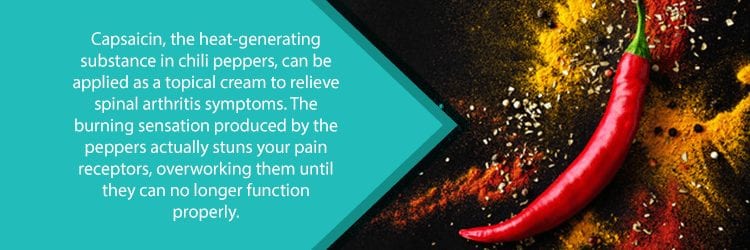
Health Benefits of Tumeric
This common spice in Indian food and curries may help those who suffer from arthritis. Closely related to the ginger family, turmeric can reduce joint stiffness and neck strain by blocking inflammatory enzymes and cytokines.
Turmeric is also great for adding color and flavor to meals, smoothies, and teas. Curcumin, the anti-inflammatory chemical in turmeric, makes up less than six percent of turmeric. Therefore, supplements like capsules or extracts can provide a much higher dose of curcumin than the spice bottle that you find in your pantry.
However, you should avoid turmeric if you are pregnant, scheduled for surgery, or are taking blood thinners.
Methysulfonylemethane for Connective Tissue & Joint Health
Otherwise known as MSM, this organic sulfur compound is naturally found in vegetables, fruits, grains, and meat. Sulfur assists the body to build connective tissue such as cartilage. In addition, it interrupts pain signals on their route to the brain.
MSM supplements can be found as tablets, capsules, or liquids. While more research still needs to be conducted, some evidence has shown MSM can help with OA.
MSM should not be used if you are taking blood thinners. While many don’t experience any side effects, some users report diarrhea or upset stomachs.
Glucosamine & Chondroitin: Arthritis Relief Super Supplements
These two supplements, often taken together, are major components of connective tissue and cartilage. Glucosamine supplements come from shellfish and vegetable sources. Chondroitin sulfate, on the other hand, is derived from animal cartilage. Taken in combination, these supplements can reduce inflammation and may even slow the progression of osteoarthritis.
In 2006, a large-scale scientific study known as GAIT investigated the impact that these two substances had on the pain levels of individuals with knee osteoarthritis. The study concluded that patients with severe joint deterioration achieved a significant reduction in their discomfort levels. In fact, after two years, some patients even reported that the combination of these supplements was as effective at joint, back, and neck pain relief as the common anti-inflammatory drug Celebrex.
While these supplements might not work for everyone, the research is encouraging. Both glucosamine and chondroitin come in tablet, capsule or powder form.
Avoid glucosamine if you are allergic to shellfish. Some individuals who take this supplement report nausea, diarrhea, and/or increased cholesterol. Check with your doctor before consuming chondroitin if you take blood-thinning medications or have a known allergic to sulfonamides. Minor side effects of these supplements may also include constipation, diarrhea, or stomach pain.
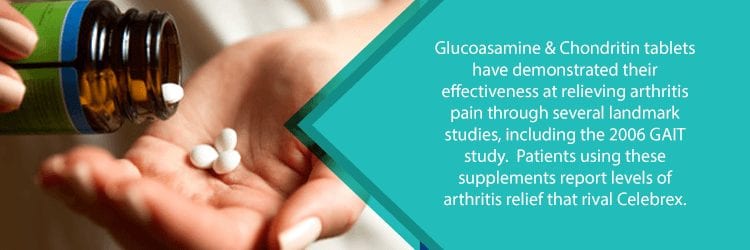
Melatonin to Ease Insomnia & Back Pain
While we sleep, our bodies undergo the process of cellular regeneration—and that includes joint repair. Unsurprisingly, individuals who suffer from insomnia symptoms not only report higher levels of stress, but also experience heightened neck and back pain.
Melatonin is a hormone that is produced by the pineal gland to regulate our sleep cycles. While melatonin doesn’t relieve arthritis pain directly, it may promote better sleep. With the proper amount of sleep, we become more resilient to disease, have more energy, and just feel better overall.
Keeping Yourself Safe
Before starting any supplements, consult with your doctor first. Certain supplements may interfere with your current medications. In addition, high doses of some supplements may lead to even more health problems. Consulting with your doctor will give you valuable insights into the appropriate doses of each item and what substances you should avoid because of your medications or health status.
Looking Beyond Supplements
Natural remedies can reduce inflammation and pain as well as encourage the regeneration of soft tissues. Some patients with arthritis find them to be very helpful. Unfortunately, others have more severe arthritic conditions that require evaluation from an orthopedic surgeon.
If you’ve found that your arthritis pain isn’t responding to supplements or conservative treatments such as pain medications or physical therapy, other options are available. Minimally invasive surgery may be the answer to your arthritis pain relief.
During minimally invasive spine and joint procedures, an orthopedic surgeon uses a tiny camera to assess joint damage and perform repairs. With the aid of a small incision, your surgeon can perform procedures like arthroscopic knee surgery. Procedures such as these not only relieve pain, but also restore lost function to your joints.
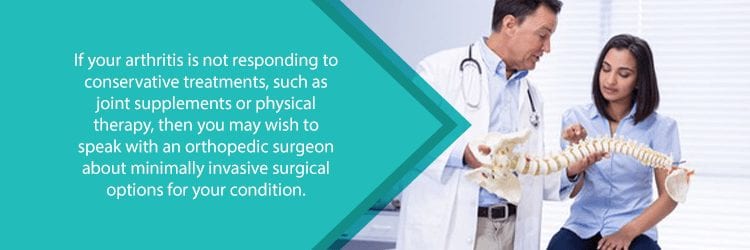
Seeking Help for Your Arthritis Pain
If arthritis has kept you from living the life you want, NJ Spine & Orthopedic is ready to help. Our caring team will empower you with information about the latest conservative treatments and therapies, such as the best supplements for you. If conservative treatments haven’t been effective in relieving your arthritis pain, we will be happy to discuss minimally invasive surgical options with you.
With the right treatment regimen, you can resume doing the things you love. Schedule an appointment today with one of our arthritis doctors to discover how NJ Spine & Orthopedic can help you!

